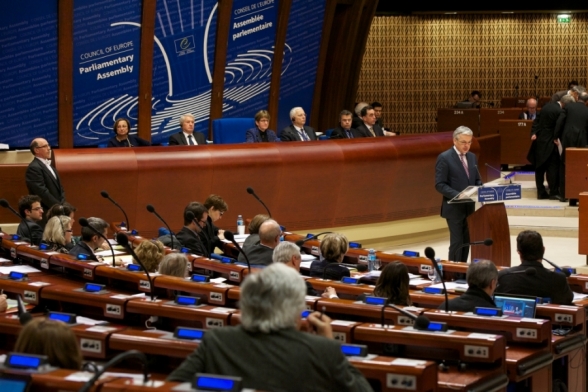It was emphasized in the Parliamentary Assembly of the Council of Europe that the Europe must show it was not afraid of continuing to use humour and satire. The hate-based attacks represent attacks on the very values of democracy and freedom itself, and in accordance with the case law of the European Court of Human Rights, the use of satire, including satire and ideas criticizing religion, are a protected part of freedom of expression, if they do not entail hate speech or incitement to violence.
The Resolution adopted after the discussion on this topic emphasises urgent need for joint, international, but especially European response to the jihadist threat. With regard to security, the PACE recommended strengthening of cooperation between intelligence services of various European countries, as well as countries in the Middle East. All security responses and activities need to be followed by undertaking of preventive measures in prisons, on social networks, in schools, in order to root out the causes of radicalism. The principle of the separation of State and religion must be protected.
During the day, special attention was attracted by debate on credentials of the delegation of the Russian Federation to the Parliamentary Assembly of the Council of Europe. The PACE decided to ratify credentials of the delegation of the Russian Federation, pointing out the need to foster dialogue, but at the same time it decided to suspend the voting rights of the Russian delegation as well as its right to be represented in the leading Assembly bodies (the Bureau, Standing Committee, and Presidential Committee of the Assembly), in order to clearly condemn continuing grave violations of international law in respect of Ukraine by the Russian Federation. The Assembly will return to this issue, with a view to reinstating these two rights at its April 2015 session if Russia has made marked and measurable progress towards implementing the demands of the PACE. Additionally, the Assembly suspended the Russian delegation’s right to be appointed rapporteur, to participate in PACE missions for observation of elections, or to represent the PACE in other Council of Europe bodies as well as other institutions. The Assembly has decided to consider setting up a special working group, with the agreement of the parliamentarians, which would, with the participation of the Speakers of the Russian State Duma and the Ukrainian Verkhovna Rada, or their representatives, work on contributing to the realisation of all the propositions made in this resolution and undertaking further action in order to implement the Minsk protocols.
In afternoon hours, a joint debate was held on the following topics: “Equality and the crisis” and “The right to bargain collectively, including the right to strike”.
The Parliamentary Assembly of the Council of Europe requested the member states to undertake a series of measures to protect and strengthen the rights to organise, bargain collectively and strike, revising their labour laws where necessary and reinforcing labour inspections. Investing in social rights is an investment in the future in order to develop and maintain strong socio-economic systems in Europe. In that respect, the social rights should be protected and promoted. The Assembly also recommends ending the financial and economic policy of austerity and undertaking activities such as such as investment, stronger involvement of social partners and the promotion of decent work for all.
At the sitting held today, in the second round of voting, Mr Branko Lubarda from Serbia was elected the judge to the European Court of Human Rights.
Members of Montenegrin delegation to PACE participated in the meetings of the following working bodies: Committee on Social Affairs, Health and Sustainable Development, Committee on Equality and Non-Discrimination, Committee on Political Affairs and Democracy and Committee on Culture, Science, Education and Media, as well as in the meetings of the Sub-Committee on Human Rights, Sub-Committee on Education, Youth and Sport, and Sub-Committee on relations with the OECD and the EBRD.
Additionally, the Head of Delegation of the Parliament of Montenegro to PACE participated in the meeting of the President of the Parliamentary Assembly of the Council of Europe with heads of national delegations.
Tomorrow the debates will be held on the following: Protection of media freedom in Europe, Tackling intolerance and discrimination in Europe with a special focus on Christians, The post-electoral shifting in members' political affiliation and its repercussion on the composition of a national delegation. The MPs will also be addressed by the Secretary General of the Council of Europe.
Montenegrin Delegation at the Winter Session is composed of: Mr Predrag Sekulić, Head of Delegation, and members: Ms Draginja Vuksanović, Mr Goran Tuponja, Mr Damir Šehović and Ms Snežana Jonica.








